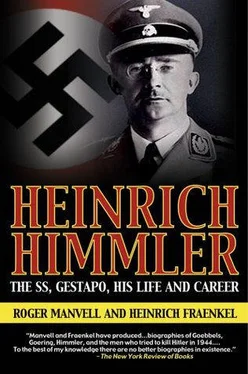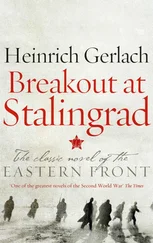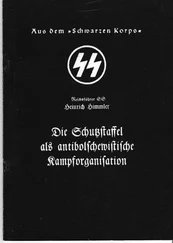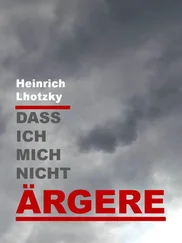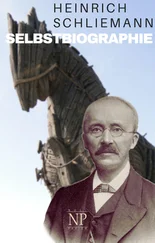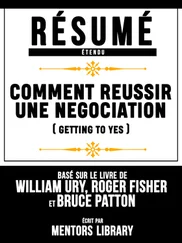Himmler was still nominally a soldier, commander of the Waffen S.S. and Commander-in-Chief of the Reserve Army, though in the turmoil of these last weeks such troops as there were left in action came under the direct orders of Hitler. Nevertheless, Himmler saw fit to issue a stern order dated 12 April decreeing the death penalty for commanders who failed to hold the towns for which they were responsible. ‘Battle commanders appointed for each town are personally held responsible for compliance with this order. Neglect of this duty by the battle commander, or the attempt on the part of any civil servant to induce such neglect, is punishable by death.’ 38
Kersten meanwhile had been waiting in Stockholm expecting to receive the formal permit for Storch to visit Germany. Bernadotte returned on 10 April, bringing with him a letter for Kersten from Brandt which, although no date was fixed for the appointment, revealed that Himmler had not forgotten his promises. He was, in fact, still very uneasy about the project. On 13 April he said to Schellenberg: ‘How am I going to do that with Kaltenbrunner about? I shall be completely at his mercy.’ This was one of the occasions when Schellenberg had to wrestle for Himmler’s soul; secret arrangements had been made with Professor de Crinis for a detailed report from Hitler’s doctor on the Fuhrer’s state of health, but this had not yet arrived to help or hinder the Reichsführer S.S. in making up his mind. Himmler took Schellenberg for a walk in the forest near the country house in Wustrow where he was staying, and unburdened himself of his worries:
‘Schellenberg,’ he said, ‘I believe that nothing more can be done with Hitler.’
‘Everything he has done lately’, urged Schellenberg, ‘seems to show that now is the time for you to act.’
Schellenberg goes on to describe their conversation:
‘Himmler said to me that I was the only one, apart from Brandt, whom he could trust completely. What should he do? He could not shoot Hitler; he could not give him poison; he could not arrest him in the Reich Chancellery, for then the whole military machine would come to a standstill. I told him that all this did not matter; only two possibilities existed for him: either he should go to Hitler and tell him frankly all that had happened during the last years and force him to resign; or else he should remove him by force. Himmler objected that if he spoke to Hitler like that the Führer would fall in a violent rage and shoot him out of hand. I said, “That is just what you must protect yourself against — you still have enough higher S.S. leaders, and you are still in a strong enough position to arrest him. If there is no other way, then the doctors will have to intervene.”’
Eventually Himmler took Schellenberg’s advice and arranged a date for Storch to come to Germany on 19 April, during a period when Kaltenbrunner was known to be going to Austria. The message reached Kersten on 17 April, but by this time Storch was unable to go to Germany. He delegated the formidable task of being the first Jew to negotiate direct with Himmler on more or less equal terms to Norbert Masur, director of the Swedish section of the World Jewish Congress in New York. He was to travel incognito in the care of Kersten. On 19 April they flew by the regular service to Tempelhof airport, the only passengers on a plane full of Red Cross parcels. When they arrived, an S.S. guard stood ready to receive them; the S.S. clicked their heels and cried, ‘Heil Hitler’, but Masur calmly raised his hat to them and said, ‘Good evening’. They then drove to Hartzwalde in an S.S. staff car to wait for Himmler, who had spent the day in Berlin conferring with Count Schwerin von Krosigk, the Minister of Finance, an interview at the Count’s house arranged by Schellenberg because he hoped the Minister might influence Himmler to take the action they all wanted him to take, ‘with or without Hitler’. 39
Himmler could not meet Masur on 20 April because it was Hitler’s birthday. He sent Schellenberg to Hartzwalde during the night of the 19th to prepare the ground for their conversations, which he was ready to begin the moment the birthday celebrations were over. Himmler, according to Schellenberg, had ordered champagne with which to toast the Führer.
But 20 April was no day for celebrations. By now, the Americans were across the Elbe and in Nuremberg; British patrols were approaching Berlin from the west and the full Russian forces were marching in from the east. The American and Russian armies were almost on the point of meeting. Hitler decided to receive his guests in the great Bunker constructed fifty feet under the Chancellery buildings and extending out under the garden. Although Himmler, against Schellenberg’s advice, had decided he had better appear and shake Hitler by the hand, he was not invited to confer in private with the Führer along with the service chiefs. Relations were cold by now. He lined up with the rest below ground to congratulate the man he had served as Reichsführer S.S. for fifteen years. Goring, Goebbels, Ribbentrop and Speer were there; so were Doenitz, Keitel and Jodl, all under the watchful eyes of Bormann. It was expected Hitler would now move south and head the great German Resistance which was due to be organized from the Obersalzberg; Himmler joined with the others in urging him to do so. But Hitler reserved his decision, only declaring that if Germany should be cut in two by the forward drive of the armies from the east and the west, then Doenitz should take charge of the defences in the north. The narrow escape route to the south was still open, and once the conference was over the great dispersal took place. Goring travelling with a fleet of cars departed importantly for the safety of Obersalzberg; Speer hurried to Hamburg intent on preserving as much of German industry from destruction as possible; Ribbentrop still hung around Berlin, his advice no longer wanted. Only Goebbels and Bormann remained fast by the side of Hitler, waiting for his decision whether they were to stay and die in Berlin or escape to the south and fight a while longer for survival.
Himmler said goodbye and set off for Wustrow, where Schellenberg was anxiously waiting for him. He was never to see Hitler again.
Himmler climbed the curved steps from the lower levels of Hitler’s bunker and passed through the passageways and corridors flanked by heavy bulkheads to protect the Führer during the final defence of Berlin. Outside these sealed cells the earth trembled with blast that was slowly disintegrating the remains of the city.
Schellenberg, anxious as ever, had been vainly trying to make contact with Himmler who, after leaving the Bunker, was confined in Berlin by the heavy air attacks which were felling more buildings around him. He did not reach Wustrow, where Schellenberg was waiting for him, until the middle of the night. After some persuasion, he agreed to drive to Hartzwalde, where they arrived between two and three o’clock on the morning of 21 April.
Kersten met him outside the house and urged him to be both friendly and magnanimous with Masur; this was his greatest chance to redeem the honour of Germany and show the world while there was still time that a new and humane policy had at last replaced the repressions and cruelties of the past. Kersten knew that an argument such as this would raise some response from Himmler’s professed humanitarianism. As they went in, Himmler assured Kersten that all he wanted now was some agreement with the Jews.
This was the first time since he had come to power that Himmler had met a Jew on equal terms. He greeted Masur formally and said how glad he was that he had come. 1They sat down, and immediately Himmler began to make a long, defensive statement about the attitude of the regime to the Jews as aliens in Germany, and how the emigration policy he had devised, which, as he said, ‘could have been very advantageous to the Jews,’ had been sabotaged by the other nations who would not receive them.
Читать дальше
